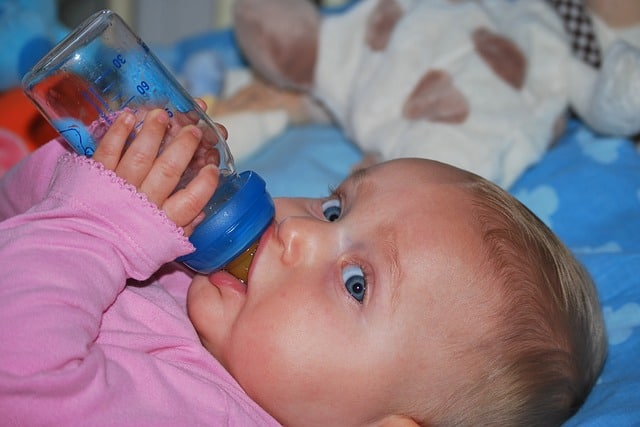2-Month-Old Baby Schedules for Restful Nights
Are you a new parent struggling to establish a routine for your 2-month-old baby? We understand that getting a restful night’s sleep is crucial for both you and your little one’s well-being. That’s why we’re here to help you create a peaceful and effective schedule that promotes healthy sleep habits and supports your baby’s overall development.
At 2 months old, babies need an average of 14-16 hours of sleep a day, with 9-12 hours at night and 4-6 hours during the day, divided into multiple naps. Establishing a consistent schedule at this age is key to ensuring your baby gets the rest they need and experiences optimal growth.
Key Takeaways:
- Creating a schedule promotes restful nights and overall development.
- 2-month-old babies need 14-16 hours of sleep a day.
- Average night sleep is 9-12 hours, while naps total 4-6 hours.
- Consistency is crucial for establishing a routine.
- Proper feeding routines should be incorporated into the schedule.
2 Month Old Development
At 2 months old, your baby is gradually moving past the newborn stage and becoming more aware of their surroundings. This is an exciting time as you start to see your baby’s personality emerge and their interactions with the world become more pronounced.
Physical Development:
By the 2-month mark, your baby will experience steady growth in both length and weight. On average, babies grow about 1 to 1 1/2 inches in length and gain approximately 1 1/2 to 2 pounds per month. These physical changes are essential indicators of your baby’s overall health and development.
Social and Emotional Development:
This is the age when your baby may start to smile at you intentionally, expressing their joy and happiness. You’ll begin to witness glimpses of their unique personality shining through. Responding to your baby’s smiles and coos encourages their emotional development and strengthens the bond between you.
Cognitive Development:
At 2 months old, your baby’s cognitive abilities continue to develop. They may start to recognize familiar objects and people, responding with increased interest and engagement. Their eyesight also improves, allowing them to see more clearly and perceive colors.
Motor Development:
Motor skills play a significant role in your baby’s development at this age. They may begin to kick their legs, crouch, and hold objects with their hands. These early motor skills are essential building blocks for future physical milestones such as rolling over, sitting up, and eventually crawling.
Remember, every baby develops at their own pace, so try not to compare your little one to others. Cherish their milestones, however small, and enjoy this special time of discovery and growth.
Quote:
“Watching my baby grow and develop at 2 months old has been an incredible journey. Seeing their first genuine smile was a moment I’ll never forget.”
Now that we’ve explored the exciting developments your baby is experiencing at 2 months old, let’s move on to understanding how to establish a healthy sleep schedule for your little one. In the next section, we’ll discuss the recommended number of naps for a 2-month-old baby.
How Many Naps for a 2 Month Old?

As your baby reaches the 2-month milestone, you might be wondering how many naps they should be taking each day. Naps play a crucial role in a baby’s development, providing them with the rest they need to grow and thrive. Here’s what you need to know about a 2-month-old baby’s nap routine and how to incorporate it into their daily schedule.
Most 2-month-old babies take around 4 to 5 naps throughout the day, with each nap lasting anywhere from 30 minutes to 2 hours. These naps add up to a total of about 4 to 6 hours of sleep during the day. The awake time between naps for a 2-month-old is typically around 1 to 1 1/2 hours.
At this age, babies are not able to stay awake for long periods of time and tend to spread their sleep throughout the day. This nap routine helps them meet their sleep needs and prevents them from getting overtired. It’s important to establish a consistent nap schedule to help your baby develop healthy sleep habits.
Activities for Your 2 Month Old Baby
In addition to napping, it’s essential to incorporate appropriate activities and playtime into your 2-month-old’s daily routine. These activities help stimulate their senses, promote their development, and provide valuable bonding time. Here are some baby activities suitable for a 2-month-old:
- Engage in tummy time: Place your baby on their tummy for short periods throughout the day to help them develop their neck and upper body muscles. This activity also aids in preventing flat spots on the back of the baby’s head.
- Read and talk to your baby: Introduce books with simple pictures and bright colors to stimulate your baby’s visual and auditory senses. Engage in conversations, sing songs, and use a soothing voice to promote language development.
- Provide sensory toys: Offer your baby toys with different textures, shapes, and sounds. Rattles, soft blocks, and teething toys can help stimulate their senses and encourage them to explore and reach for objects.
- Play gentle games: Encourage interaction through gentle games such as peek-a-boo or gently tickling their toes. These activities promote social and emotional development by fostering a bond between you and your baby.
Remember, every baby is unique, and their development may vary. It’s important to observe your baby’s cues and adjust their routine and activities accordingly to meet their individual needs and preferences.
By incorporating regular naps and engaging activities into your 2-month-old baby’s daily routine, you can help promote their development, ensure they get the rest they need, and create a nurturing environment for them to thrive.
Feeding a 2 Month Old
At 2 months old, babies have small stomachs and require frequent feedings to support their growth and development. When it comes to feeding schedules for your 2-month-old, there are a few important factors to consider.
Breastfed Babies
If you are breastfeeding, your 2-month-old baby may need to nurse every few hours during the day. Breast milk is easily digestible, so babies tend to feed more frequently than formula-fed infants. Pay attention to your baby’s hunger cues and offer the breast whenever they seem hungry. Remember, breastfeeding is not only about nourishment but also provides comfort and strengthens the bond between you and your little one.
Formula-Fed Babies
Formula-fed babies can typically go longer between feedings compared to breastfed babies. They may need to be fed every 3 to 4 hours during the day. Follow the instructions on the formula package for the proper amount and frequency of feedings. It’s essential to consult with your pediatrician to determine the best feeding schedule for your baby’s specific needs.
A 2-month-old baby still requires night feedings to ensure they receive enough nutrition for healthy growth and to maintain your milk supply if you are breastfeeding. Remember, establishing a feeding schedule that works for your baby may take some trial and error, so be flexible and responsive to their needs.
Introducing Solid Food
It’s important to note that introducing solid food to a 2-month-old baby is not recommended. At this age, babies are not developmentally ready for solid foods, as their digestive systems are still maturing. Breast milk or formula provides all the necessary nutrition for your baby’s growth and development during the first 6 months.
Pay close attention to your baby’s hunger cues, such as lip-smacking, sucking motions, or turning towards the breast or bottle, to establish a feeding schedule that meets their needs. Remember, every baby is unique, so trust your instincts and work with your pediatrician to create a feeding routine that suits your little one.
Sample 2 Month Old Baby Schedules

Here are two sample schedules for 2-month-old babies, one for breastfeeding or reflux and one for formula-fed babies. These schedules include fixed points for wake time, naps, and feedings, and can be customized to fit your baby’s unique needs. It’s important to note that every baby is different, so feel free to adjust these schedules to match your baby’s natural rhythm and preferences.
Breastfeeding or Reflux Schedule:
- 7:00 AM – Wake up and feed
- 8:00 AM – Nap #1 (1-1.5 hours)
- 9:30 AM – Wake up and feed
- 10:30 AM – Nap #2 (1-1.5 hours)
- 12:00 PM – Wake up and feed
- 1:00 PM – Nap #3 (1-1.5 hours)
- 2:30 PM – Wake up and feed
- 3:30 PM – Nap #4 (1-1.5 hours)
- 5:00 PM – Wake up and feed
- 6:30 PM – Catnap (30 minutes)
- 7:00 PM – Wake up and feed
- 8:00 PM – Start bedtime routine (bath, massage, lullaby)
- 8:30 PM – Nighttime feeding
- 9:00 PM – Bedtime
Formula-Fed Schedule:
- 7:00 AM – Wake up and feed
- 8:00 AM – Nap #1 (1-1.5 hours)
- 9:30 AM – Wake up and feed
- 10:30 AM – Nap #2 (1-1.5 hours)
- 12:00 PM – Wake up and feed
- 1:00 PM – Nap #3 (1-1.5 hours)
- 2:30 PM – Wake up and feed
- 3:30 PM – Nap #4 (1-1.5 hours)
- 5:00 PM – Wake up and feed
- 6:30 PM – Catnap (30 minutes)
- 7:00 PM – Wake up and feed
- 8:00 PM – Start bedtime routine (bath, massage, lullaby)
- 8:30 PM – Nighttime feeding
- 9:00 PM – Bedtime
These sample schedules provide a framework for your 2-month-old baby’s routine. Remember, every baby is unique, so it’s essential to tailor the schedule to suit their individual needs. By establishing a consistent routine, you can help your baby find comfort and security, promoting better sleep and overall development.
Tips for Better Sleep
To promote better sleep for your 2-month-old baby, it’s important to create a relaxing and peaceful sleep environment. Start by using room-darkening shades to block out any excess light that might disturb their sleep. Consider using soothing colors and soft lighting to create a calm atmosphere. Additionally, investing in a comfortable mattress can make a significant difference in your baby’s sleep quality.
Follow safe sleep guidelines by always placing your baby on their back to sleep. This position reduces the risk of sudden infant death syndrome (SIDS) and ensures their airways remain clear. Avoid using soft bedding, such as pillows and blankets, as they can pose suffocation hazards.
Establishing a bedtime routine is key to helping your baby recognize when it’s time for sleep. Consistency is key, so try to follow the same routine every night. This can include activities like a warm bath, a gentle massage, or reading a bedtime story. By repeating these soothing activities, you’ll signal to your baby that it’s time to wind down and prepare for sleep.
Consider introducing the practice of putting your baby down drowsy but awake. This technique can help them learn to self-soothe and fall asleep independently. Although it may take time for your baby to become comfortable with this routine, it promotes healthy sleep habits in the long run. Remember, each baby is unique, so be patient as sleep patterns vary and take time to develop.
FAQ
How many hours of sleep does a 2-month-old baby need?
At 2 months old, babies need an average of 14-16 hours of sleep a day. They sleep 9-12 hours at night and 4-6 hours during the day, broken into several naps.
What are the milestones for a 2-month-old baby?
At 2 months old, babies may start to smile more, show some personality, recognize objects, see in color, and develop motor skills such as kicking, crouching, and holding objects.
How many naps should a 2-month-old baby take?
Most 2-month-old babies take 4 to 5 naps each day, totaling about 4 to 6 hours of sleep. Their awake time is typically around 1 to 1 1/2 hours between naps.
How often should a 2-month-old baby be fed?
At 2 months old, babies have small stomachs and need to be fed frequently. Breastfed babies may need to feed every few hours during the day, while formula-fed babies can go longer between feedings.
Can I introduce solid food to my 2-month-old baby?
No, introducing solid food at 2 months old is not recommended as babies are not developmentally ready for it.
Can I customize the sample schedules to fit my baby’s needs?
Yes, the sample schedules provided can be adjusted to match your baby’s natural rhythm and preferences.
How can I promote better sleep for my 2-month-old baby?
To promote better sleep, create a relaxing sleep environment, follow safe sleep guidelines, establish a bedtime routine, and introduce the practice of putting your baby down drowsy but awake.










